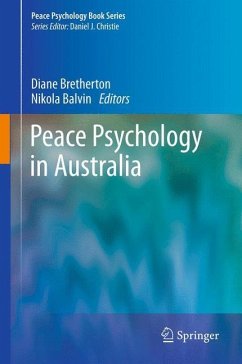This book is a case study of the development of peace psychology in Australia. While there is, in comparison to other countries, relatively little overt violence, Australia the nation was founded on the dispossession of Indigenous people, and their oppression continues today. Peace Psychology in Australia covers the most significant issues of peace and conflict in the country. It begins with a review of conflict resolution practices among Australia's ancient Indigenous cultures and succinctly captures topics of peace and conflict which the country has faced in the past 222 years since British settlement. The fast population growth, thriving multiculturalism, leadership in international affairs and environmental isolation make Australia a microcosm for the study of human conflicts and peace movements.
Bitte wählen Sie Ihr Anliegen aus.
Rechnungen
Retourenschein anfordern
Bestellstatus
Storno








